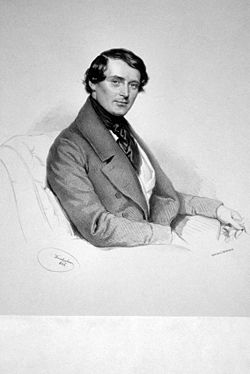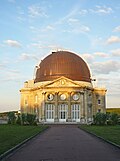The Vienna Observatory (German: Universitätssternwarte Wien) is an astronomical observatory in Vienna, Austria. It is part of the University of Vienna. The...
4 KB (409 words) - 19:49, 22 January 2025
Urania is a public educational institute and observatory in Vienna, Austria. Urania Observatory (German: Urania Sternwarte) was built in 1909 according...
4 KB (272 words) - 16:47, 14 October 2024
where his son who succeeded him was born. He became director of the Vienna Observatory in 1819. He served in this position until his death in 1840. He created...
5 KB (364 words) - 15:34, 31 October 2024
This is a list of observatory codes (IAU codes or MPC codes) published by the Minor Planet Center. For a detailed description, see observations of small...
429 KB (109 words) - 19:13, 26 May 2025
reflecting telescope) in 1868, a 27-inch (0.69 m) refractor for the Vienna Observatory in 1878, and the Greenwich 28 inch refractor in 1893. Leading up to...
22 KB (2,247 words) - 22:45, 25 May 2025
Karl Ludwig Littrow (category University of Vienna alumni)
Vienna and Berlin, receiving his doctorate at the University of Krakow in 1832. In 1842 he succeeded his father as director of the Vienna Observatory...
2 KB (208 words) - 19:10, 7 May 2024
Zängerle Vienna Observatory Francis Stephen Award List of Jesuit sites "Search". Internet Archive. "Figures and Facts" (PDF). University of Vienna. Archived...
40 KB (3,480 words) - 09:43, 19 May 2025
discovered on 29 September 1884 by Austrian astronomer Johann Palisa at Vienna Observatory and named after a nymph from Greek mythology. Later telescopic observations...
58 KB (5,803 words) - 02:20, 11 May 2025
the Minor Planets. Cincinnati, Ohio: Minor Planet Center, Cincinnati Observatory. OCLC 224288991. "Guide to Minor Body Astrometry – When can I name my...
172 KB (448 words) - 07:49, 30 May 2025
Austrian Empire, who first worked at the Vienna Observatory and later spent most of his time at the Paris Observatory, observing comets and asteroids. He provided...
4 KB (335 words) - 05:08, 31 October 2024
diameter, that was discovered by Austrian astronomer Johann Palisa at Vienna Observatory on 12 November 1885. It has a relatively elliptical orbit that requires...
16 KB (1,629 words) - 06:51, 24 March 2025
asteroid, discovered on 31 March 1886 by astronomer Johann Palisa at Vienna Observatory, Austria. The stony S-type asteroid measures about 12 kilometers in...
4 KB (208 words) - 19:20, 30 May 2025
discovered on 4 October 1885, by astronomer Johann Palisa at the Vienna Observatory in Austria. The S-type asteroid (S/L) has a rotation period of 20...
17 KB (1,109 words) - 19:19, 30 May 2025
aperture.The second largest refracting telescope in the world is the Yerkes Observatory 40 inch (102 cm) refractor, used for astronomical and scientific observation...
39 KB (1,053 words) - 09:23, 14 May 2025
assistant at the Hamburg Observatory and became a professor at Hamburg in 1916. In 1928 he became director of the Vienna Observatory, Austria. When the Nazi...
2 KB (180 words) - 13:07, 27 March 2024
Joseph Rheden (category University of Vienna alumni)
studies in astronomy at the University of Vienna between 1897 and 1901, he worked at the Vienna Observatory, where he made his discoveries of three asteroids...
4 KB (289 words) - 15:32, 20 March 2025
longitude of Vienna and in early trigonometrical mapping of the region. He was the last of the Jesuit astronomers at the Vienna observatory. Liesganig was...
7 KB (846 words) - 20:26, 27 May 2025
an Austrian astronomer at the Vienna Observatory. Photometric observations of this asteroid at the Organ Mesa Observatory in Las Cruces, New Mexico, during...
4 KB (228 words) - 09:35, 2 August 2024
November 1875, from the Austrian Naval Observatory in Pula. The name was chosen by Edmund Weiss of the Vienna Observatory; although the name refers to Abundantia...
5 KB (333 words) - 11:20, 2 August 2024
1869 he became a professor at the University of Vienna. He was named the director of the Vienna Observatory in 1878. He also served as president of the Austrian...
4 KB (285 words) - 03:05, 25 April 2024
University of Vienna, where he studied law before devoting himself to astronomy. In 1827 he became an assistant at the Vienna Observatory, from which he...
2 KB (230 words) - 11:40, 20 October 2024
asteroids. It was discovered by Austrian astronomer Johann Palisa at the Vienna Observatory on 3 October 1911, and subsequently a lost minor planet for 89 years...
15 KB (1,196 words) - 00:59, 4 June 2025
new (1895) 76 cm (30 in) at Pulkovo observatory in the Russian Empire, and the 68 cm (27 in) at Vienna Observatory (completed early 1880s). In the records...
10 KB (976 words) - 14:14, 11 December 2024
diameter. It was discovered by Johann Palisa on 19 August 1882 at Vienna Observatory, Austria. Photometric observations during 2003 showed a rotation period...
6 KB (287 words) - 01:23, 30 May 2025
Maurice Loewy (category Scientists from Vienna)
their home town.[citation needed] Loewy became an assistant at the Vienna Observatory, working on celestial mechanics. However, the institutions of Austria-Hungary...
4 KB (377 words) - 13:45, 20 September 2023
discovered on 27 August 1914, by Austrian astronomer Johann Palisa at the Vienna Observatory. The presumed C-type asteroid has a rotation period of 9.1 hours and...
12 KB (850 words) - 13:40, 7 July 2024
Palisa on 25 April 1890 at the Vienna Observatory. Photometric observations of this asteroid at the Leura Observatory in Leura, Australia during 2006...
4 KB (272 words) - 00:34, 31 May 2025
to a large telescope with a lens, usually the largest refractor at an observatory with an equatorial mount. The preeminence and success of this style in...
37 KB (3,266 words) - 20:18, 26 May 2025
in diameter. It was discovered by Johann Palisa on 5 April 1886 at Vienna Observatory, Austria. It is named after Silesia, the province of the discoverer's...
4 KB (182 words) - 19:20, 30 May 2025
belt. It was discovered by Austrian astronomer Johann Palisa at the Vienna Observatory on 23 March 1920. The carbonaceous C-type asteroid (Ch) has a long...
15 KB (1,079 words) - 23:14, 22 December 2023






















